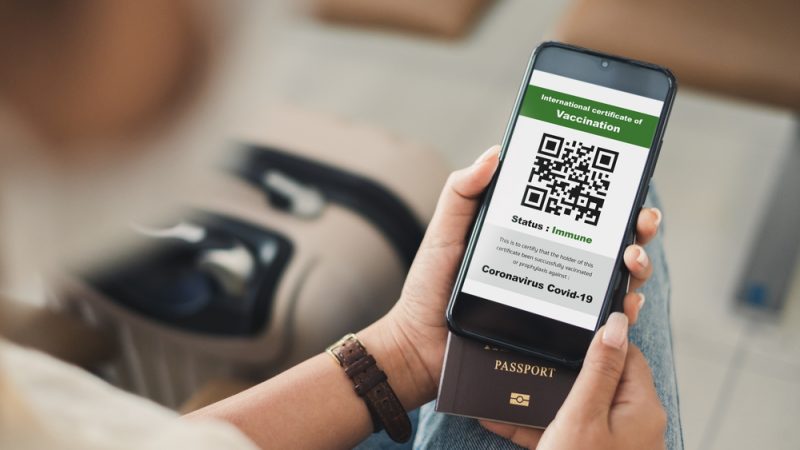The European Union has moved another step closer to reviving free movement after reaching a provisional consensus on an EU COVID travel pass.
Agreeing in a political sense on Thursday, the European Parliament and Council will now look to formalise the proposed legislation. This is expected to mark a watershed moment in the pandemic.
What is the new certificate?
The EU Digital COVID Certificate (EUDCC), previously called the Digital Green Certificate, will allow for travel restrictions to lift across all 27 member states – and will be available for specific non-EU countries, too.
It will consist of information about an individual’s vaccination, test and/or recovery status in regards to COVID-19. Formulated as a QR code, the person travelling can choose to carry either a digital or paper-based certificate.
Can my country refuse to comply?
Short answer – no. The certificate is set to be formalised by the passing of an EU regulation, which is a binding legislative act. This means it must be applied in its entirety across the bloc.
When can I get one?
Hopefully, by June. The regulation will come into force on July 1 and will have a six-week phasing-in period for any member states that need more time.
However, European Commission President Ursula von der Leyen said on Thursday the system would be ready at an EU level “in the next few days”, meaning member states would shortly be able to begin their domestic rollouts.
Do I have to pay?
No. The EUDCC will be free of charge.
Which vaccines are recognised?
All COVID-19 vaccines authorised by the European Medicines Agency will be recognised by the EUDCC.
These include the jabs developed by Pfizer/BioNTech, Moderna, Oxford/AstraZeneca and Johnson & Johnson.
Member states will also be free to decide for themselves whether to accept other vaccines.
What if I’m not vaccinated? Am I banned from travelling?
Not at all. The EU has stressed that the new certificate will not become a pre-condition to free movement across the bloc; rather, it will facilitate the fundamental right.
“There is no discrimination against individuals who are not vaccinated,” according to a fact sheet released by the Commission. “Persons who are not vaccinated must be able to continue to exercise their free movement rights, where necessary subject to limitations such as testing or quarantine/self-isolation.”
Which tests will be accepted?
So-called NAAT tests (including RT-PCR tests) and rapid antigen tests will be recognised. For the time being, this will not include self-tests.
Can I use my certificate to go to the wider EEA, UK or Switzerland?
The EU has already said it is open to the EUDCC being implemented in EEA countries (Iceland, Liechtenstein, Norway), as well as Switzerland.
Both Norway and Switzerland have pledged to create their own vaccine certificates to be compatible with the EU, while Iceland has permitted entry to vaccinated EU tourists for several months already.
Meanwhile, the UK is still set to carve out an agreement with the bloc – and is currently rolling out its own vaccine certificates through its National Health Service.
The UK is also operating a traffic light system (red, amber and green) for international arrivals.
Travellers from countries on the red list can only enter if they are UK or Irish nationals, or if they have UK residency status. Amber countries require a COVID test to be taken before travelling, 10 days of quarantine upon arrival, and two more COVID tests to be taken on day two and eight after arrival.
Green list countries require a COVID test taken before and after arrival in the UK. However, Portugal is the only EU country currently on this list.
What about the United States?
Much of the world’s population, including Europe, has been barred from travelling to the US since the early days of the pandemic – and this doesn’t look set to change very soon.
According to the US Travel Association, authorities will be looking to the EU‘s plan for reviving international travel to “hopefully spur the US to heed the many calls for a plan and timetable to safely reopen our borders”.
Will the pass be secure?
The QR code will comprise a digital signature which will come from an issuing body, which could be a hospital, test centre or health authority. Each body will have a unique digital signature key and will be stored in a secure data base in each country.
“The European Commission will build a gateway,” the fact sheet said. “Through this gateway, all certificate signatures can be verified across the EU. The personal data of the certificate holder does not pass through the gateway, as this is not necessary to verify the digital signature.”
How long is the certificate valid?
Validity will depend on how relevant the certificates are at any given time, as well as scientific evidence and national rules across each member state.
Will this certificate be with me forever?
This isn’t the plan. The EU maintains the certificates are strictly linked with the pandemic. Therefore, once the World Health Organisation (WHO) declares the end of the public health emergency, the certificate system will also be suspended.
This also means it could be reactivated in a case where the WHO declares another public health emergency.

